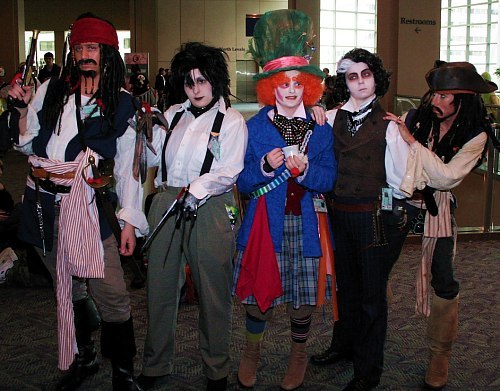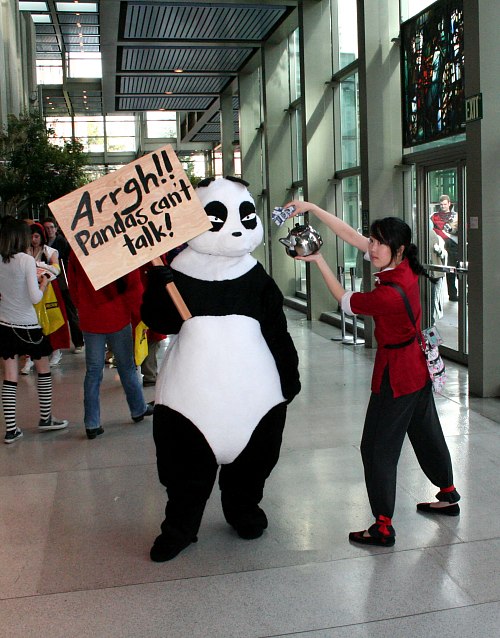Robert Plamondon's Poultry & Rural Living Newsletter,
April 8, 2010
This newsletter goes out to people who signed up for it. If
you don't want to receive it anymore, see the instructions at the
bottom of the page. (If that doesn't work, send me an email.)
On the other hand, if you know anyone who might enjoy this
newsletter, please forward a copy to them, and they can use the
form at the bottom of the page to sign up!
News From the Farm
Between Market Seasons
We had a great run at the Corvallis Indoor Market, which ran through the end of March, and are now
in the quiet period before the regular farmer's market season begins on April 16. Sales at our two local supermarkets (Richey's and
Albertson's in Corvallis) are brisk. Because this is the natural laying season, it's the time of year where we expect high
competition and downward price pressure, but
so far we haven't seen it this year. This might change when the farmer's markets open.
Springtime
It being April, the grass is growing like mad, and the off-and-on rain is keeping the ground too wet to mow. Sigh. This
happens every year.
We're ramping up for broiler production and already have broilers on pasture. Our broilers are kept on a well-drained hill that
never gets muddy, no matter how much it rains. Our hen pasture is flatter and there's some mud around the houses. When things dry
off a little, we'll move the henhouses to a fresh patch of pasture. Fresh green grass means that our chicken
and eggs have the best flavor of the year. When things brown off during the summer, the flavor fades a bit.
We have two brooder houses in use. The new one is being used for pullet chicks and also as an incubator house. (We're hatching turkey
eggs again this year: Bourbon Reds.) The new house is very nice, dry and odor-free even with 100 eight-week pullets in it.
Yes, I've Ordered an iPad
I've ordered a 3G iPad, which ought to arrive before my next newsletter. I couldn't resist!
I have an iPod touch that I use for
email, to listen to audiobooks, for music, and as a PDA, but its lack of 3G means that it only works in places with WiFi. Also,
it's desperately slow. I don't have an iPhone because AT&T connectivity is hopeless on the farm.
ith the iPad, I can get
Internet connectivity anywhere (except maybe on the farm, but I have WiFi here, so it doesn't matter). My laptop weigs a ton
and takes forever to boot, so I normally don't carry it around with me. The iPad is light and instant-on. I'll let you know
how it works out.
Too Many Books!
If you're looking for a deal on some of my books, you're in luck! I have more inventory than I know what to do with, so I've
started auctioning books on eBay again. I'll keep selling off books every week until the boxes of books that are in my way are
used up. Sometimes the books go for a penny, but I need the space!
Help for Aggressive Roosters
People often ask me how to handle difficult roosters. They
tell me, ďI went out into the chicken yard to collect eggs, and the rooster
attacked me. Of course, I had to show him whoís boss, so we had a fight, and I
won!Ē
And I assure them, ďSure, I can show you how to fix this,
and itís worth it: imagine how much more pleasant your life will be when you
never had to worry about a rooster again. But first, I want more detail. So youíre
out in the chicken yard, and there he is. He acts in a threatening manner. You
act in a threatening manner back. He acts even more threatening, and before you
know it, the two of your are fighting. Right?Ē
ďSure.Ē
Then I ask, ďBut did I just describe what happened from the
roosterís point of view, or from yours?Ē
Maybe youíve heard that a stage hypnotist can make you think
youíre a chicken. Thatís nothing! Even a chicken can make you think youíre a
chicken! In these barnyard fight scenes, the rooster is in charge from start to
finish. First, he decides whatís going to happen: a fight, right here, right
now. Then he gets you to join the fight. How does this happen? And how do you
make it stop?
But letís not give too much credit to the rooster. The issue
isnít that the rooster is powerful, but that the human automatically accepts whatever role
is thrust on him,
and that means that even a chicken can redefine who you are! Ö at least
for a minute or two.
Of course, everyone makes mistakes, and the first time a
rooster attacks you, itís a big surprise. You canít expect to do your best
decision-making when startled, so the first time doesnít count, as far as Iím
concerned. Weíve all been there. But whatís the long-term solution?
Donít forget, a rooster who thinks that youíre a fellow
rooster is mistaken! And by fighting him, you are not only †participating in
his delusion, youíre reinforcing it. First he was
convincing you, and now youíre convincing him.
Suppose you win. Whatís the payoff? The glory of vanquishing
an eight-pound bird? Sort of a foregone conclusion, wasnít it? (And what is all
this fighting going to look like to the neighbors? Are you sure you can explain
it to your kids Ö or the cops?)
This reminds me of another problem: people who are overly
competitive on the highway. Every time someone passes them, they take it as a
challenge and an insult. They want to out-speed every speeder and out-reckless
every reckless driver. They seem to
latch onto the identity of whoever attracts their attention.
Kind of thoughtless, don't you think?
Itís not hard to desensitize an aggressive rooster. The
first step is to desensitize yourself. Look deep into my eyes: Youíre not a chicken.
Rooster rules donít apply to you, and this means that you are free to
act in an un-rooster-like manner. You have options, and the most important
option is to reject the roles that others project onto you.
I use only three techniques for desensitizing aggressive
roosters:
- Never fight them. If they attack me, I withdraw
slowly, without fighting back. This is not difficult. Roosters arenít very
dangerous and this isnít a life-or-death struggle. A chicken canít force
you to do anything: the choices are all yours.
- Donít scare them or walk directly towards them as
if youíre going to run them down. If you watch the roosters, youíll notice
that their behavior changes before they attack. They do a little dance and
give other signals that theyíre feeling threatened. Donít trigger this
behavior. If you do, back off a little, and theyíll forget all about you.
- Feed them handfuls of grain. Roosters know that
other roosters donít double as feed dispensers, so when they associate you
with food, itís hard for them to think of you as a fellow rooster.
Youíll be amazed at how quickly these techniques work and how
much better you feel about your chickens, and how much more confidence and
control youíve achieved. By observing your chickensí behavior but not
participating in it, you can give them what they really need, not what they
think they want.
Don't forget to ask yourself, "Do I really need a rooster?" Sometimes they're nothing but a
burden or a disappointment. For example, some people get a rooster to father baby chicks, but then
never get around to hatching any. If offspring were the plan, but there arenít
going to be any, youíve set your autopilot on a one-way trip to
nowhere.
Itís easy to get rid of roosters if you offer them for free
on Craigslist or in your local newspaper. (They will probably end up in
someoneís stew pot, but at least someoneís enjoying them.) Itís almost
impossible to get rid of roosters with a ďfree to good homeĒ ad.
I remember an old farmer telling me once that, with livestock, the
important thing is to think through the relationship. Youíre supposed to
be building a pleasant present and a better future. Unless thatís where things are headed,
itís time to make changes. He expressed this as, ďThereís a livestock
auction every Thursday.Ē What he meant was that we can end an unsuccessful
relationship quickly — and we should, because once things go sour, everyone's a loser.
It's time for someone else to give it a try.
As for me, I like having them around, and my farm is a good place
for them. Your situation may be different, though.
Sadly, I donít have a fix for angry drivers. Grain is hard
to dispense on the freeway! But when other drivers are playing chicken, you
can play human. Anger is a habit you can break, and itís not as if all
those bozos on the road are important to you, anyway. ďI wonder where heís
going in such a big fat hurry?Ē is a perfectly adequate response.
And, you know, if you fight the rooster, heís going
to come back for a rematch. In a pecking order, victory is always temporary;
every fight is just the warm-up act for the next fight. And once
the rooster starts attacking one human, he tends to attack others, too. Donít
you just hate it when roosters attack little kids? I sure do! These problems
donít go away by themselves: you have to resolve them.
Not to mention that putting on your human hat puts you in
control of your livestock and your life. Itís like the Kung Fu master said: If
you can make it across the chicken yard, Grasshopper, you will become a master.
Sometimes, though, people who ask me for rooster advice reject
the whole concept. I don't know why, but some
of them walk away still believing they have no choice but to keep kicking
around their roosters. Itís sad. Hard on the roosters, too.
The Life of a Writer
Okay, so I have a full-time job and I have a farm and I have Norton Creek Press, so you'd think I don't
have any free time at all — and you're right. But last weekend, my son Dan and I took some of the free time I don't have
and had a wonderful time at
Sakuracon in Seattle. Sakuracon is the Northwest's biggest anime con.
Anime,
in case you haven't been paying attention, is Japanese animation, which differs largely from
American animation by having "more" — more violence, more romance, more plot twists, more sex appeal, more continuing
story lines, more weapons and gadgets, more everything. For the beginner, I
recommend Miyazaki's Castle in the Sky, which was dubbed into English and
distributed by Disney.
I gave a well-attended workshop on Friday on the topic of "Speed Writing," giving an example of how I once wrote
a 120,0000-word book in 13 weeks,
largely through the magic of insane, publicly announced deadlines. I'll write it up for my Web site some day.
My overriding purpose is to get more publicity as an author. Two of my books,
One Survivor (my science fiction novel) and
Through
Dungeons Deep: A Fantasy Gamers' Handbook (my guide to role-playing games), fall comfortably within
the range of topics welcome at anime conventions. I hope
that this will help create a following and build sales. In the meantime, it's fun!
While I saw people of all ages there, anime conventions are dominated by young people, and most of them, and especially the girls,
appear in costumes from various anime shows, movies, or whatever:



As usual, we took the train to Seattle, using the fancy Amtrak Cascased commuter trains, which I always enjoy.
I once commuted to Camas, Washington on these trains twice
a week. You can read my writeup here.
Norton Creek Press Best-Seller List
I started Norton Creek Press in 2003 to bring the "lost secrets of the poultry masters" back into print --
techniques from the Golden Age of poultrykeeping, which ran from roughly 1900 to 1950. I've recently started
adding an eclectic mix of non-poultry books as well.
Here are March's top-selling books:
- Fresh-Air
Poultry Houses by Prince T. Woods, M.D.
- Success
With Baby Chicks by Robert Plamondon
- The Dollar Hen by Milo M. Hastings
- Feeding Poultry by G. F. Heuser
- Ten
Acres Enough by Edmund Morris
All of these are fine books (I only publish books I believe in).
If you're like most readers of this newsletter, you want to buy
Fresh-Air
Poultry Houses and Success
With Baby Chicks
first. These cover the basics of healthy, odor-free, high-quality chicken housing and zero-mortality chick
brooding, respectively, and get rave reviews from customers, who often buy extra copies for friends!
April Notes
April is a month of new beginnings, which means that most of us feel great. Spring is here!
The worst problem is the tendency to overdo things, and bite off more than we can chew. Remember to do your chores
in a "youngest-first" order — that is, take care of baby chicks first, then your older birds, and do the same
for your other livestock. The tenderest critters need to be squared away completely. The rest can wait, if necessary.
The standard to-do list for April is:
- Brood chicks.
- Spread winter poultry manure and don't let manure accumulate until the end of the growing season. Plant food belongs with the plants, not in piles.
- Replace winter litter, which may be pretty nasty by now. If you're using the deep litter method, skimming off a fraction of the litter
to keep it from growing too deep is a good idea.)
- Give growing birds more room.
- Stop using lights on hens. (April 1 is the traditional date to turn off the lights; September 1 is the traditional date to turn them back on)
- Provide more ventilation for comfort.
- Hatch baby chicks.
- Gather eggs more frequently in warm weather.
- Remove wet or soiled litter.
List inspired by a similar one in Jull's Successful Poultry Management, McGraw-Hill, 1943.
Read My Blog
Recent Blog Posts
|
|
A lot of material that doesn't end up in this newsletter is published in my blog, which I update a few
times a week. You can read my blog at http://www.plamondon.com/blog, or
subscribe to it via RSS in the usual way.
New! You can also receive notifications of blog updates by email:
Subscribe
Adventures in Social Media
And if that's not enough, you can use social media like Twitter to keep track of my doings:
- Twitter. I've started using Twitter several times a week to announce special deals on books,
updates to Web pages, new blog posts, amusing links,
and other interesting stuff. Check it out.
- Facebook. If you're on Facebook, so am I! You can
friend me and follow my antics that way. My Facebook updates are almost identical to my Twitter updates.
This newsletter is sent out occasionally by Robert Plamondon
to anyone who asks for it. Robert runs Norton Creek
Press, publisher of:
Norton Creek Press
36475
Norton Creek Road
Blodgett, Oregon 97326
nortoncreekpress@plamondon.com
http://www.nortoncreekpress.com
If you like this newsletter, please send copies to all your
friends!
Copyright by Robert Plamondon.
Permission is granted for copying if it's attributed to me, and if it includes a link back to the original
page
on www.plamondon.com.
To subscribe or unsubscribe from this mailing list, use the
handy box below:
|
|





